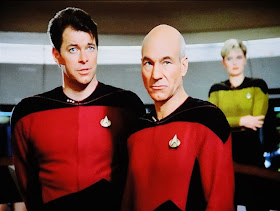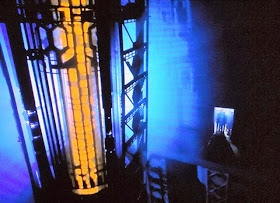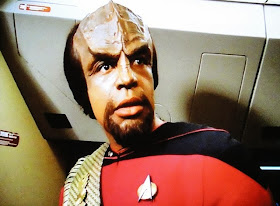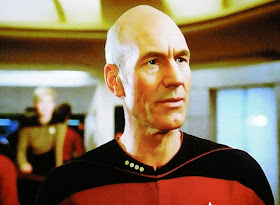"You are trifling with the primal instincts of our species. I must warn you that human parents are quite willing to die for their children."
-Captain Jean-Luc Picard-





Late director Kim Manners joined the crew of the Enterprise-D for just one go on Star Trek: The Next Generation (1987-1994). Manners would eventually move on to become a critical part of the directorial success behind The X-Files (1993-2002) along with director Rob Bowman, who also worked on ST:TNG. Unfortunately, Manners had harsh words for the working environment on his experience with ST:TNG and his singular contribution to the series. He waxed on about that subject in Starlog #227 in June 1996. There was a cinematographer on the set, Ed Brown, who Manners quickly discovered to be a creatively hostile force in his humble opinion.


"I was dollying all over, and I showed both the actors and Ed Brown what I wanted to do. He looked at me and said, 'Can I see that again?' I said, 'Sure.' So, I showed him the shot again, and he looked at his gaffer and said, right in front of me, 'It's going to be a long seven days with this guy!' Well, it was the longest seven days of his life, because for seven days, that camera never stopped moving. He hated me, but I did it on purpose, and I called my agent and said, 'Get me out of here, it's not a good place to work.' There were several directors who came in on the first season and never went back."

Certainly Manners had an unpleasant memory of his one and only contribution. Richard Compton [Haven] never returned as well. Writer Tracy Torme noted in Starlog Magazine #143, despite the positives, that in his experience after the first two seasons, due to a sense of creative alienation, "the show has developed a reputation for being a difficult place to work" (p.64).

So with When The Bough Breaks that was all she wrote for Kim Manners on ST:TNG. Manners, despite his close working relationship with Rob Bowman, who also worked on ST:TNG more regularly, wasn't certain of Bowman's take regarding the set of ST:TNG's mood. "I never did discuss Star Trek with Rob Bowman [who directed over 10 Next Generations]" as they were too busy on The X-Files to actually discuss it. Given all of the adversity on set it's interesting that Season One and sometimes early in Season Two of ST:TNG the show feels high on ideas, but low in successful execution. This, of course, is much less so in the second season especially as that season gets rolling. The first season, primarily, is filled with great concepts and ideas but less than stellar stories, and only occasionally do the creative minds behind it all get the balance and execution just right in winning fashion. When The Bough Breaks is another example of that kind of missed opportunity.



Nevertheless, Manners would one day become a stable force behind The X-Files. How fitting he should work opposite another alum from The X-Files Season One in actor Jerry Hardin (the first of two appearances including ST:TNG, Season Five finale Time's Arrow). Though, Manners would not join The X-Files until Season Two. Brenda Strong (Desperate Housewives, Party Of Five), though she offers little here, also guests as the crew of the Enterprise-D discovers the mythological planet of Aldea. Normally cloaked in darkness and rarely revealed, the crew of the Enterprise witnesses its existence for the first time and entirely by the designs of the Aldean people.

Star Trek: The Next Generation, Season One, Episode 17, When The Bough Breaks sees the highly advanced Aldeans in full control of the Enterprise and her crew. Deanna Troi, the ship's empathic advisor, senses a purpose by the Aldean's revealed. Without warning after an unexpected greeting, an Away team of the Aldeans' choosing are beamed down to the planet in the form of Commander William Riker or Number One, Dr. Beverly Crusher and Troi.

The Aldeans have no children left. They can no longer reproduce and thus they yearn for Federation children. With Number One's only answer as refusal, the team is beamed back aboard the Enterprise. Children are removed from the ship without approval. The children are thus stolen without permission.
Wesley is also abducted along with the younger children. It is Wesley's role to lead them according to Radue, played by Hardin. Wesley provides a kind of surrogate parent role to the other children throughout the story in the absence of their parents. Actor Wil Wheaton's actual siblings were actually among the children cast.

The story rather limps along and is a bit hard to swallow as the intelligent, but desperate, Aldeans suddenly take the Enterprise children. The writer, Hannah Louise Shearer, asks us to buy into the fact that a race of humanoids that behave much like ourselves with a love for children and a requirement to endure through them are yet somehow completely devoid of emotion, remorse or empathy regarding the actual abduction of children. It's a difficult proposition to accept.


Meanwhile, Picard, Riker, Data and the crew work to find weaknesses in the essentially impregnable shield of the planet.
On Aldea, Wesley learns of The Custodian, a computer-system created by the Progenitors hundreds of centuries ago. Now that is advanced! How does it work? Does it break? These questions are never answered, but Wesley asks some good questions. Despite these good questions the Aldeans seem content on leaving their comfort and well-being to the Custodian with no intention of understanding anything but the arts.

Picard and Crusher meet with Radue in the hopes of convincing him through diplomacy of his truly horrific judgment. Crusher manages to slip an instrument to Wesley who is able to scan his guardian. Shortly thereafter Crusher and Picard are beamed back aboard the Enterprise and the ship is hurled into space. Despite their genetic deficiencies to have children, the Aldeans display true god-like power.
Once again, we discover how empty the Aldean civilization is without children, but also how lazy it has become. It's also a bit creepy. There is no thirst or hunger for knowledge. It is an empty shell of its former self completely absent of self-reliance. But of course, without children to lead - it has nothing at all. Their people are lost and about to sunset into oblivion.


Crusher determines the Aldeans are dying not only without children, but as a race. Crusher and Picard know that if they can determine some answers they may be able to save the Aldeans and get their children back.
As Wesley gathers the children to discuss passive resistance, his mother Beverly Crusher determines a potential weakness in the O-Zone layer that may be affecting their health. The deterioration of the O-Zone issue was a hot topic back in the 1980s and into the 1990s. What has become of that environmental hot button issue? I suppose it falls under the global warming umbrella. Ultimately, for the Aldeans, radiation poisoning is the problem.

The reality, as noted earlier, is that the civilization has become so comfortable they no longer question anything or determine their own troubles relying solely on the Custodian. In effect, the Aldeans are destroying themselves from within. There are echoes here of Space:1999, Year One, Episode 8, Guardian Of Piri. There are indeed other influences here.
Picard and crew will help them. "The legend will die, but the people will live."


When The Bough Breaks is a fairly unbearable episode and it has nothing to do with the more than competent turn by actor Wil Wheaton who is central to the story and other fine performances. It's entirely the story, which is weak with poor ideas and plenty of lapses in logic. Some terrific close up work behind the camera by Manners cannot work wonders into this lacking story. Some gorgeous effects shots of the Enterprise set in the foreground to the orange planet of Aldea remain a highlight for me here. There's really not much else to say. When The Bough Breaks is barely satisfactory reminding us once again of the uneven first season. Many of the episodes fall under a similar umbrella in this first season, whether it be awkward stumbles in scripting or pacing or execution, saved only by a cast that continues to click in the chemistry department. But stories like this one lack palpable tension and credible conflict-resolution scenarios.

In keeping with my recent look at Stargate Universe, it breaks your heart to think that those far superior two seasons of SGU couldn't be rewarded with a third. How sadly short-sighted we are sometimes. Still, the first season of ST:TNG is not without its moments and the second season, despite a few lemons, is really where the show hits its stride and all of the problems you feel with this first season simply just melt away as it all comes together and you get lost within a very real and new Star Trek series.


When The Bough Breaks: C-
Writer: Hannah Louise Shearer.
Director: Kim Manners.




















Great review SFF.
ReplyDeleteThis episode reminds me how very lucky The Next Generation was that it had two words associated with it: Star Trek.
Otherwise, it may have been canceled after one season.
When people complain about Space:1999 or SGU being bad, my knee-jerk response is that it is unfortunate that those two series didn't get three seasons and 60 or so episodes to get the formula right, like TNG got.
Sometimes history is all about luck. TNG was very, very lucky indeed.
best,
John
Boy, that's the truth! Star Trek and luck. Big factors in the early going.
ReplyDeleteThanks for the comment John.
Btw, I recently watched The Royale and went back to read what you had written about it. I couldn't agree more. It's a fine episode...
... particularly when compared to something like this.
One thing they got right was the casting especially when you see how seamless they move as an ensemble in and out of one another's dialogue by the second season. What a joy to watch by that point.
Thank you.
Great review of a very poor episode. I had a real problem staying interested in this one. I actually found the camera work even more distracting because the story was so weak. It felt like the camera was calling attention to itself. But I think you're right, they were trying to compensate for such a weak script.
ReplyDeleteJohn is right about luck. Season one has some real losers and not many shows would have survived that. But I'm glad it did survive. I've just finished season 5 and had a really great time with it. Some real classics there.
Hi Roman
ReplyDeleteWell, now you know, based on some input here from Manners regarding that camera work. He was clearly going out of his way to piss some people off to boot.
But, good point, some times interesting direction can compensate to some degree for a weak script but as evidenced here not enough.
And, totally agree, ST:TNG is filled with some tremendous heart and character and some exceptional episodes.
I'm finishing a run at Season Two and there are some excellent moments. In fact, by the middle of Season Two, and I'll definitely be making note of it if I ever get there one day, but I have completely gotten lost in the characters and I am not noting the problems, distractions, disconnects, etc.. that once existed in this first season.
It all comes together much more naturally by the middle of Season Two and thespian Patrick Stewart is actually a joy to watch. He's amazing with his dialogue. Frakes has come into his own as a force as well. It's a lot of fun and thankfully they got past this rough start otherwise it would have been a Star Trek footnote that was never well thought of. Interesting.
I started watching some ST:NG this week. I was wanting to watch some SF a bit more mature in scope and outlook.
ReplyDeleteI missed a lot of NG due to my working schedule when these were on TV,and I'll admit some eps. were hit and miss. I didn't care for the soap opera of a lot of this series. It seemed everyone was teaming up with someone in the romance department, except for the Ferengi. But there's a lot of good episodes too. It's been fun rewatching them.
I must admit, apart from Season One, I really am enjoying the walk through ST:TNG. I've seen many episodes but I always knew I missed some.
ReplyDeleteThis is like watching Lost straight through for me.
ST:TNG is amazing and there are far more good to excellent episodes following Season One than there are lemons.
I am enjoying the heck out of it particularly the observations on humanity and existence and, well, relationships. It is definitely handling these very real issues within the context of science fiction better than I could possibly have imagined based on Season One.
Some of the episodes are downright poetic and Patrick Stewart is splendid as the Captain as it turns out.
Anyway, really enjoying ST:TNG as a cerebral science fiction with exceptional character depth.